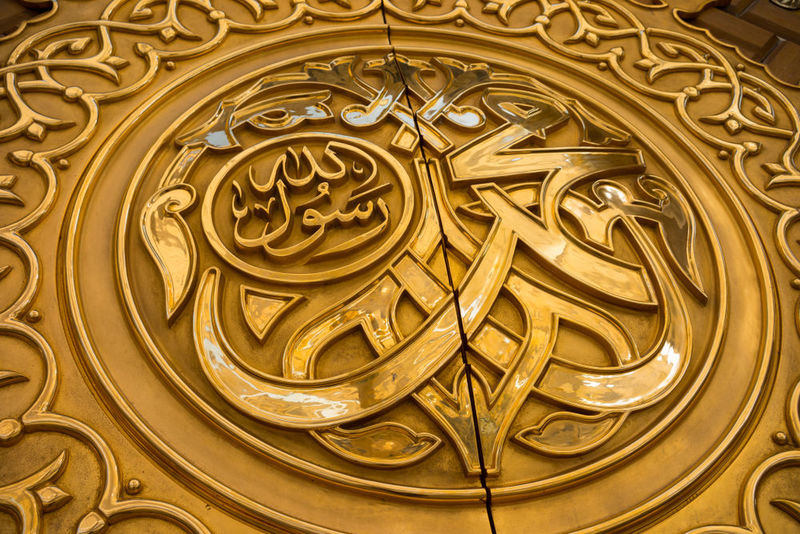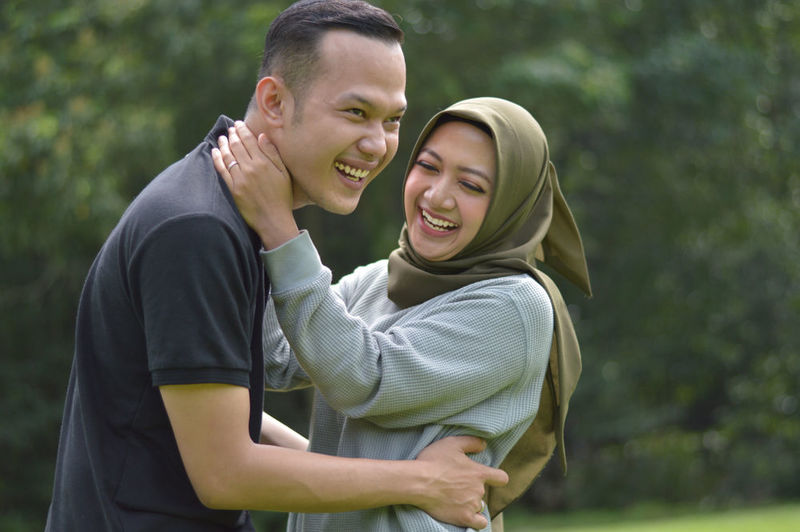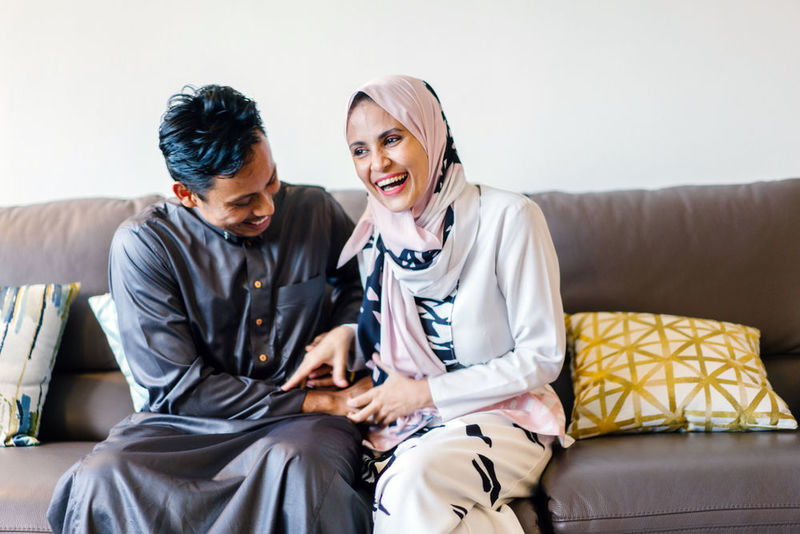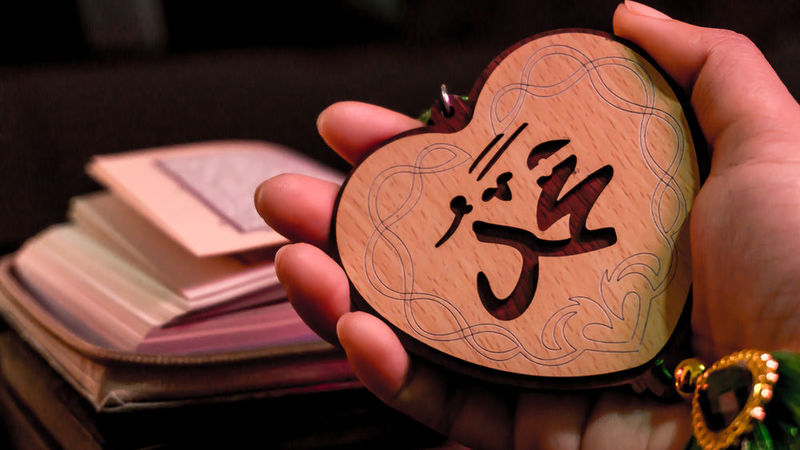3 Things Prophet Muhammad S.A.W. Taught Us About Love

It is in the innate nature of men and women to love. Love is one of the most amazing gifts of life that Allah s.w.t. has granted to His servants. Prophet Adam a.s. and his wife were blessed with love for one another. Indeed, love is an integral part of human existence.
The final messenger sent to humanity, Prophet Muhammad s.a.w, showed us that the ideal marital relationships are the ones that bear the fruition of love (mawaddah), mercy (rahmah) and tranquility (sakinah). Through the beautiful stories of Prophet Muhammad’s relationship with Khadijah r.a. and Aisyah r.a., we can extract various learning points that can be contextualised to today’s millennial married couples. In studying Prophet Muhammad’s marriage life, here are some key learning points:
1. Physical and Emotional Tranquility is Important

Rasulullah s.a.w. may have lived in a world where patriarchy was probably the norm. However, in his relationship with his loving wife Khadijah r.a, we learn that Prophet Muhammad s.a.w. was far from being patriarchally bias. Rasulullah s.a.w. showed us that marriage is a relationship that is based on mutual love, trust and respect. He taught us that marriage is not in the hands of men alone to decide everything while women are there only to be subservient to their men.
Instead, we learnt how as the wife of Rasulullah s.a.w, Khadijah r.a. was an independent and accomplished lady. Her marriage with Rasulullah s.a.w. did not stop her entrepreneurial spirits. In their household, Khadijah r.a. did not simply play an ornamental role to the Prophet s.a.w. Rather, she played a major role as an equal, where both husband and wife completed one another.
After Rasulullah s.a.w. received the first revelation, where he encountered the Angel Jibril a.s. in Jabal Nur (Mount of Light), he came home shivering. He looked for a blanket to cover himself. Khadijah r.a. provided him with the blanket and tried to calm her beloved husband. At that moment, she was thinking straight and tried to understand what her husband was going through. Upon finding out what happened, Khadijah r.a. responded to her husband by trying to comfort him and address his concerns. Khadijah r.a. assured her husband that he is a good person who takes care of others, speaks the truth, helps the poor and treats his guests generously. She was confident that her husband would not be forsaken by God. In the hadith, it was mentioned that Khadijah r.a. replied to Rasulullah s.a.w:
كَلاَّ أَبشِر فَوَاللَّهِ لَا يُخْزِيكَ اللَّهُ أَبَدًا، وَاللهِ إِنَّكَ لَتَصِلُ الرَّحِمَ، وَتَصدُق الحَدِيثَ وَتَحْمِلُ الْكَلَّ، وَتَكْسِبُ الْمَعْدُومَ، وَتَقْرِي الضَّيْفَ، وَتُعِينُ عَلَى نَوَائِبِ الْحَقِّ
"Never! Be rejoice! By Allah, Allah will never disgrace you. By Allah, you keep good relations with others, you speak the truth, you carry the burden of the poor and help the destitute, you serve your guests generously and assist those afflicted with calamities."
(Sahih Muslim)
This episode clearly shows how Khadijah r.a. provided emotional tranquility for her beloved husband, the Prophet s.a.w. She assured him by highlighting his virtues and reminding him that Allah will not forsake a good person like him. Khadijah r.a. stood by the Prophet s.a.w and gave him assurance that he was chosen to do this sacred duty as he is meant for it and it was something that he was prepared for.
Rasulullah s.a.w. also listened to Khadijah r.a. She arranged for the Prophet s.a.w to meet her uncle who was knowledgeable in the Divine scriptures. Khadijah r.a was a wise lady who was very rational and calm in facing such situations. She tried to ensure that she was there for her beloved husband and tried to solve the issues that he was facing. On the other hand, Rasulullah s.a.w appreciated and listened to her as they faced this situation together as husband and wife.
The story of Rasulullah s.a.w. and Khadijah r.a. demonstrates a relationship that is based on mutual love, trust and respect. Rasulullah s.a.w regarded his wife as a partner of equal, and he had always confided in her. She believed in him and he loved her deeply. Their home environment was an abode of tranquility and mercy. In line with the objectives of marriage in Islam, Allah s.w.t mentioned in the Surah Ar-Rum, verse 60:
وَمِنْ ءَايَٰتِهِۦٓ أَنْ خَلَقَ لَكُم مِّنْ أَنفُسِكُمْ أَزْوَٰجًا لِّتَسْكُنُوٓا۟ إِلَيْهَا وَجَعَلَ بَيْنَكُم مَّوَدَّةً وَرَحْمَةً ۚ إِنَّ فِى ذَٰلِكَ لَءَايَٰتٍ لِّقَوْمٍ يَتَفَكَّرُونَ
“And one of His signs is that He created for you spouses from among yourselves so that you may find comfort in them. And He has placed between you affection and mercy. Surely in this are signs for those who reflect.”
(Surah Ar-Rum, 20:30)
2. Understanding Verbal and Non-Verbal Expressions

Rasulullah s.a.w. taught us that communication is key to building a harmonious relationship. He showed that communication is a two-way street. The husband does not have the absolute authority in marriage. The Prophet s.a.w. showed that a wife has the right to express her feelings and views.
In internalizing the story of Rasulullah s.a.w with Aisyah r.a, there are numerous examples where she was dedicated with the space to express her feelings and perspectives. Clearly, the Prophet s.a.w. and Aisyah r.a communicated profoundly, including verbal and non-verbal expressions.
Rasulullah s.a.w. had always been someone who understood his wife dearly. He listened to Aisyah r.a. and was able to notice whenever his wife was angry as he was very observant of the verbal and non-verbal signals by his wife. In a hadith narrated by Aisyah r.a., Rasulullah s.a.w said,
"إِنِّي لَأَعْرِفُ غَضَبَكِ وَرِضَاكِ" قَالَتْ قُلْتُ وَكَيْفَ تَعْرِفُ ذَاكَ يَا رَسُولَ اللَّهِ, قَالَ "إِنَّكِ إِذَا كُنْتِ رَاضِيَةً قُلْتِ بَلَى وَرَبِّ مُحَمَّدٍ وَإِذَا كُنْتِ سَاخِطَةً قُلْتِ لَا وَرَبِّ إِبْرَاهِيمَ" قَالَتْ قُلْتُ أَجَلْ لَسْتُ أُهَاجِرُ إِلَّا اسْمَكَ
“Indeed, I can tell when you are angry or pleased with me.” I (Aisyah r.a) said, “How do you know that, O Messenger of Allah?” The Prophet said, “Verily, when you are pleased, you say: Yes, by the Lord of Muhammad! But when you are upset, you say: No, by the Lord of Ibrahim!” I (Aisyah r.a) said, “Yes, I do not leave out anything but your name.”
(Narrated by Imam Bukhari)
Indeed, Rasulullah s.a.w. truly understood Aisyah’s feelings. She had the space to express her emotions, whether she’s happy or otherwise. For a wife of the Prophet, Aisyah r.a. expressed her anger and unease at times. After all, it is human nature to have feelings.
Today, there are those who invoke a husband’s supposed superiority to deny their spouse any rights and space for them to express their disagreements. Expressing their anger or disagreeing with their husbands are regarded as acts of rebellion or being an indocile wife. Clearly, this runs contrary to the teachings of love and mercy towards our spouse as espoused by Rasulullah s.a.w.
3. Love Language of Rasulullah s.a.w

Rasulullah s.a.w loved to express his love for his wife and he did it constantly throughout his marriage. With Aisyah r.a, he called her by the beautiful name of Humayrah (the Reddish) in praise for some of her facial features to be reddish in colour, which she liked a lot. He was never stingy with his gestures of love and tenderness. For instance, he would drink from the same spot of the cup where Aisyah r.a. sipped water from.

Rasulullah s.a.w. was described,
كنتُ أشربُ منَ القدَحِ وأنا حائضٌ فأناولُهُ النَّبيَّ فيضعُ فاهُ على موضعِ فيَّ فيشربُ منْهُ وأتعرَّقُ منَ العرقِ وأنا حائضٌ فأناولَهُ النَّبيَّ فيضعُ فاهُ على موضعِ فيَّ
“I used to take a sip from the cup, at a point when I was in a state of menstruation. I then passed it over to the Prophet where he would place his lips on the place where I had placed mine and drank from it. I would also nibble a bone where there is some meat are left. I then passed it over to the Prophet s.a.w and he again would place his lips on the place where I left mine.”
(Hadith by Imam An-Nasa’i)
Rasulullah s.a.w would always find means to reassure Aisyah r.a. of his deep love towards her. The Prophet s.a.w showed that love needs to be nurtured and continue to blossom between husband and wife. It takes two to make a marriage work and therefore, commitment and dedication between husband and wife is important. The Prophet s.a.w. showed that it is important for a marital relationship to have intimacy, passion and commitment.
In discussing the commitment, Prophet Muhammad s.a.w did not rely solely on Aisyah r.a. to settle the household chores. We know from the Sirah (History of the Prophet) that Prophet Muhammad s.a.w would fix his own things such as sewing his garments. He did his share of the household demands and was not a demanding husband. Aisyah r.a described in a hadith:
مَا كَانَ النَّبِيُّ صلى الله عليه وسلم يَصْنَعُ فِي بَيْتِهِ قَالَتْ كَانَ يَكُونُ فِي مِهْنَةِ أَهْلِهِ ـ تَعْنِي خِدْمَةَ أَهْلِهِ ـ فَإِذَا حَضَرَتِ الصَّلاَةُ خَرَجَ إِلَى الصَّلاَةِ
"What did the Prophet s.a.w use to do in his house?" She replied, "He used to keep himself busy serving his family and when it was time for prayer, he would go for it."
(Hadith by Imam Bukhari)
For today’s millennial couples, many things can be learnt here. Indeed, household chores are not by default the duty or role of women. The division of household duties is subject to agreements between both the husband and the wife. From the story of Rasulullah s.a.w, we learn that women are not the de facto patron of the kitchen. Identifying needs and negotiating duties are important in making a relationship work based on the different contexts of every couple.
Rasulullah s.a.w. provided us with exemplary traits in building a marriage on the basis of love, mercy and tranquility. His love for Aisyah r.a. was powerful and her love for Rasulullah s.a.w was profound.
As the lovers of Rasulullah s.a.w, we should emulate his beautiful traits. Rasulullah s.a.w. mentioned that,
“The best among you is the best towards his family, and I am the best of you to my family.”
(Hadith by Imam Tirmizi)
May Allah s.w.t keep us among those who will be granted the love of Rasulullah s.a.w. and be among those who follow his footsteps in treating our spouses with utmost love and respect. May Allah s.w.t instill in our hearts the genuine love in loving others, and make us among those who are true in our submission to the Master of the Heart, Amin.
And Allah knows best.

